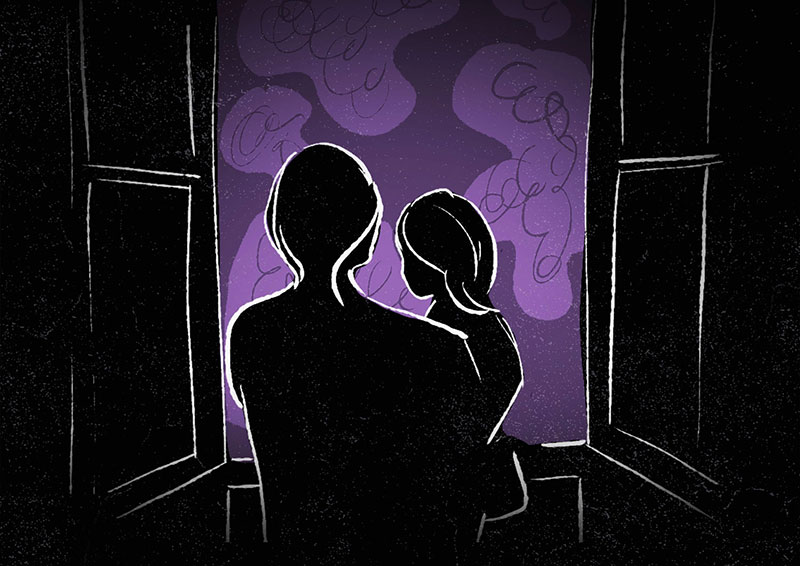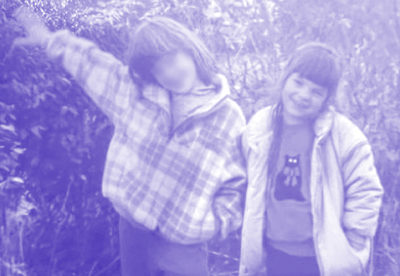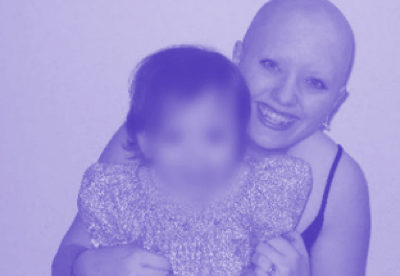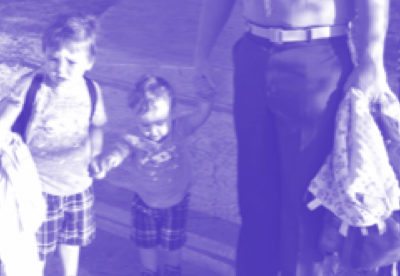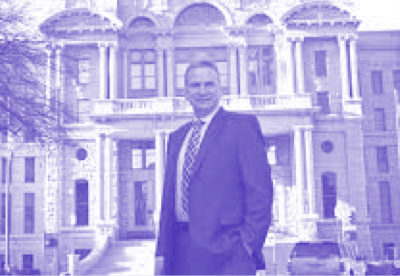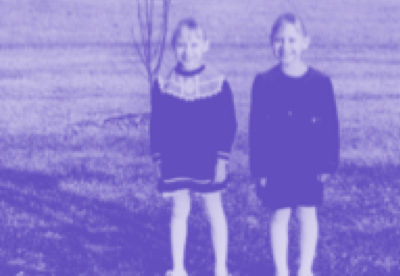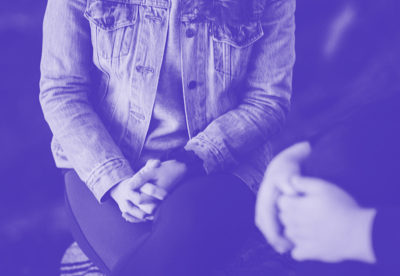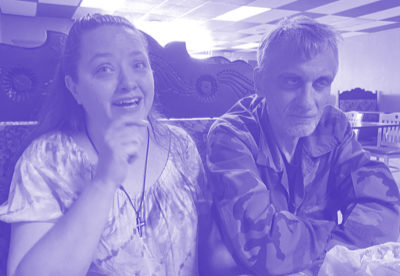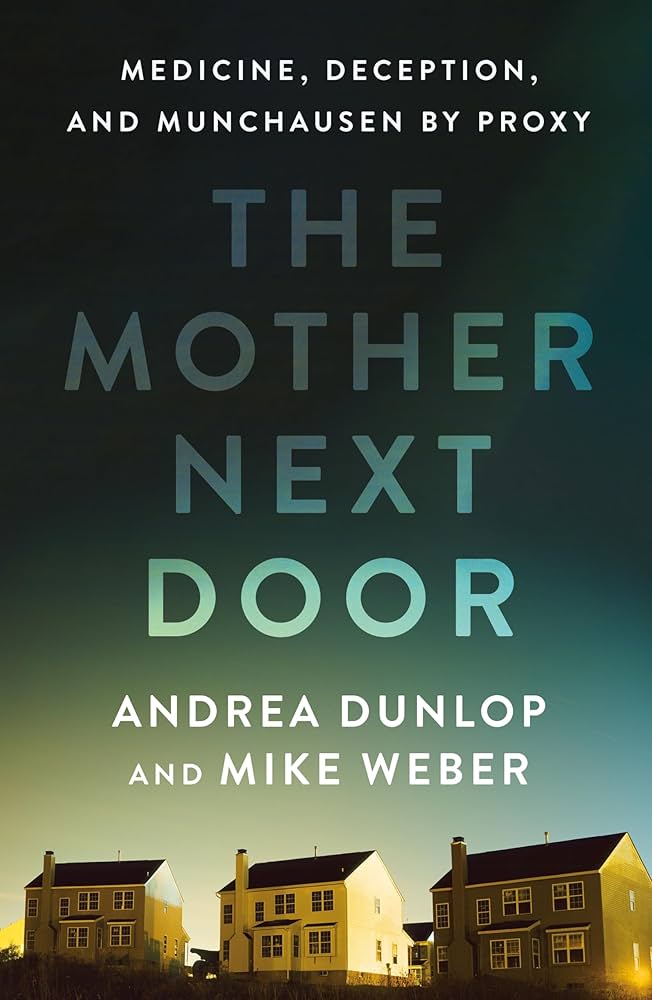SEASON 01 | EPISODE 08
There’s Hope
Andrea has made an intense connection with Hope Ybarra’s family, and asked experts, doctors, and the detective so many of her burning questions about Munchausen by Proxy. But she’s become increasingly fixated on talking to Hope herself as she comes to realize that it may be her only chance to get the insights she needs . In the stunning season one finale, Andrea travels to Mountain Home, Idaho to meet with Hope Ybarra.
In this intense, emotional back-and-forth, we hear straight from Hope what life is like for her after being released from prison. We find out what she’s up to and what she hopes for from the future. Hope listens to her own family-all of whom she’s estranged from with the exception of Robin-talk about what she was like before everything fell apart. She insists that she still loves her children, despite what she did. We see the human being behind the monstrous acts that splashed Hope’s story across headlines and landed her in prison for a decade.
Andrea asks Hope what might have been done to help her and what she might say to her younger self if she could go back. Finally, she tells Hope that if she really wants her family back, she should get treatment and offers to help her if she wants that.
Hope is friendly and warm in person, but Andrea is left with the unsettling truth that she hasn’t changed.
Host Andrea Dunlop:
https://www.andreadunlop.net
For behind-the-scenes photos:
https://www.instagram.com/andreadunlop/
Support the show and get exclusive bonus content:
https://patreon.com/NobodyShouldBelieveMe
For information and resources:
https://www.munchausensupport.com
The American Professional Society on the Abuse of Children’s MBP Practice Guidelines can be downloaded here.
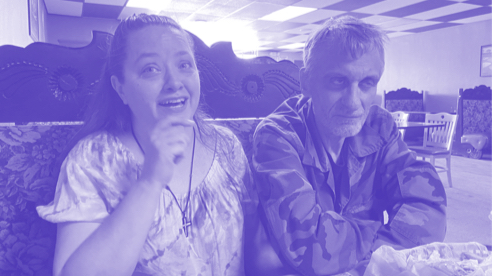
Andrea: [00:00:00] Nobody should believe me is a production of large media. That’s L A R J Media. Before we begin a quick warning that in this show we discuss child abuse and this content may be difficult for some listeners. If you or anyone you know is a victim or survivor of medical child abuse, please go to munchhausen’s support.com to connect with professionals who can help.
Andrea: Hi, I’m Andrea Dunlop. Welcome to Nobody Should Believe Me. This is our final episode of Season one. If you are just joining us, please go back and start at the first episode. Everything is now available for you to binge. I have really been enjoying connecting with you on Patreon this season. We have some awesome content over there.
Andrea: I’ve been doing a Postscript episode every week after the episode airs. Just following up on what was in that episode and how it’s landing in the world. We are featuring extended cuts of some of the interviews that we’ve done, including with experts. And for today’s [00:01:00] episode, we have a really exciting extended cut, which is my entire conversation with Hope Ibarra.
Andrea: It was a really fascinating one, and because of the sensitive nature of that conversation, I am only going to be sharing that on the Paton. So you can find that at patreon.com/nobody should believe me, or we will also link to it on our show notes. And just to give you a heads up, as for what’s gonna come on the Patreon, once the season has wrapped, I’m gonna be doing some in between season content.
Andrea: I’m going to be covering some munchhouse and by proxy cases that have been in the news recently. I’m gonna be following up with some of our experts and some of the other folks that were on season one. And I’m gonna be giving you behind the scenes content into the making of season two. And while you’re here, let me just tell you, season two is going to be amazing.
Andrea: I am already so excited to share this next story with you guys. We have done a lot of the interviews already and we [00:02:00] are putting it together. It is a second gripping. Horrifying. But ultimately, I think extremely hopeful story again, out of Texas. So while it is gonna be a whole new case and a whole new group of people, you are gonna be seeing some familiar faces or rather hearing some familiar voices.
Andrea: And I’m just really excited to get even deeper into looking at some of these systemic issues to hear some more first person accounts. And we’re also really gonna dive more deeply into what life looks like for survivors.
Andrea: People believe their eyes. That’s something that actually is so central to this whole issue and to people that experience this, is that we do believe the people that we love when they’re telling us something. I’m Andrea Dunlap, and this is, nobody Should Believe me. I wanna preface this episode by [00:03:00] reiterating that my sister has never been charged with a crime.
Andrea: The two investigations into her for medical child abuse have left me with a fear that has persisted every day of my life for the last decade. Hope Ybarra is really the embodiment of this fear, and talking to her was a profound experience for me. And much of what you’re gonna hear in this episode is my genuine emotional reaction in the moment, and I really wanted to preserve it as such.
Andrea: I’ve never been able to have a conversation with my sister about why she did things like shave her head in high school or apparently fake an entire pregnancy and miscarriage. Hope is a person who we know has done those things, and she is maybe the only person that I will ever talk to in my life who could give me some insight into why.
Tina Nole: All right, here we go. [00:04:00] They’re
Andrea: on the road.
Tina Nole: Finally, finally,
Andrea: I had been text messaging with hope now for months, and as the meeting time approached, I got more and more nervous.
Tina Nole: What do you wanna get out of this personally?
Andrea: For me, the thing that I could never do and that I do not foresee having an opportunity to do in my life is to sit down with my sister.
Andrea: And say, I can help you. But that’s true that I could help her. Like I think there’s this part of me that, like one of the things I’ve really wrestled with in this podcast that I didn’t really even realize I was holding onto. Is this hope that I’ll do this and that she’ll hear it and say, I’m exhausted. I wanna come home.
Andrea: Help me come home. [00:05:00] You know, if hope could get to a healthier place, that would be a good thing. If that could play out in some sense that like Robin could have a better relationship with her, if Paul could have some kind of peace with that situation late in his life, and if they could have some kind of healing.
Andrea: Again, this is not like the thing where like, okay, they’re all gonna be having Sunday dinner every day. You know? It’s like, I don’t think that’s like a realistic outcome for families that have this kind of thing happen. If her kids could get some answers, it could be better than it is now. And I think that if there’s a chance for me to leave this family situation a little better than I found it, and I think that would really help me too.
Andrea: That’s like a personal motivation. I wanna look at her and say like, I guess I wanna look at her and say like, I’m so. Sorry that you [00:06:00] were in so much pain that you felt like you had to do these destructive things. Like, I’m sorry you found yourself in that place. That must have been really awful. That doesn’t excuse anything that she did, but that’s true.
Andrea: I do feel that way. I started off. 10 years ago w with my sister wanting to help her, and that was because I still loved her. And you know this question of like the mental illness thing, it’s really tricky because where I think we associate mental illness with like someone not being in their right mind.
Andrea: They’re doing a specific thing to get a specific outcome and they’re doing it knowingly and that’s a really hard thing to to empathize with, but I think it’s really important that we keep in mind that they’re doing it because they’re in a lot of pain, and if we could address that pain before they get so destructive, that would be ideal.
Andrea: Okay, here we go. [00:07:00] Hope it’s suggested that we meet at a burger joint in the tiny Idaho town where she now lives. My producer Tina Noel, who’d been with me on this entire journey, and I walked through the door of this little burger joint that had this retro fifties decor and was playing, uh, like fifties jukebox music.
Andrea: And we sat down in a booth and glued our eyes to the door. I sent Hope a text message letting her know that we were there and she said she would be there in a few minutes. And even with that text message, I just still had no idea whether or not she was going to show. And furthermore, whether or not she was going to want to record the conversation or whether this conversation was going to be productive on any level.
Andrea: Hi. Nice to meet you.
Hope: Nice to meet you.
Andrea: You wanna go watching Hope? Walk through the [00:08:00] Door? She felt strangely familiar right away. We had been text messaging back and forth for months and there was a little bit of intimacy that had developed. We asked Hope almost immediately if she would be willing to let us record the conversation and she agreed.
Hope: Yeah. I Hope Alison Pucher and I give you permission to use whatever’s on this recording for whatever means you need to use it.
Tina Nole: Thank you, miss.
Andrea: It was really focused on trying to have this be a conversation between two women. So we started off just with small talk. This is my favorite place though. It’s a good spot.
Andrea: So what else is there to do here in, uh, townhouse?
Andrea: Um, all we do is, um, when we go out to eat, this is out to
Andrea: eat. This is the big day night spot.
Hope: Uh, well, and we don’t hardly ever do it. Yeah, we don’t go out, we don’t do much. Um, we sit at home and now that we’ve got a dog, now we’ve got the, our baby morning.
Hope: Take care of the baby morning.[00:09:00]
Andrea: Even though hope seemed warm and friendly and on one level of forthcoming from the get-go, she was keeping up the facade that she is deaf. This is something that she’s done for many years now. She did it in all of her prison interviews, and she did it with her parents when they would come to visit her, despite the fact that.
Andrea: We know she is not deaf. I made a very deliberate choice not to challenge her on this assertion or really anything that she was going to say during the course of this conversation because I knew that that would lead to defensiveness and I wasn’t looking to hope to get facts. I was looking her to her to get insights and to have what I hoped would be a human moment between the two of us.
Andrea: You’ve been written about a lot, and I wanted to keep [00:10:00] this podcast from being a thing about you, not with you. And so now that we have, you are, are with us, you’re about to start a new job at Walmart. What makes you happy now? What brings you joy now?
Hope: Right now, being with him, that’s what makes me happy.
Andrea: Hope is referring here to her boyfriend who joined her for the interview.
Hope: He’s very affectionate, very much a caregiver like me, so we take care of each other. Now, the day goes by that he doesn’t tell me something sweet or special.
Andrea: What do you want people to know about hope?
Hope: That I’m an individual. I have feelings, um, and that I love my family, especially my children, more than anything on this planet.
Hope: Regardless of what I’ve done and the choices that I’ve made. What I would say to all of them is that I am so sorry. For everything that I put them through. [00:11:00] I was selfish. I love my family, special med children more than anything on this planet. It was not fair and not right that I put them through what I put them through.
Hope: She was lowering my baby girl. And I have so much regret for hurting her and in the process hurting the other two as well. I was selfish and I will carry that guilt for the rest of my life for hurting all of them. My biggest hope is that, that my kids one day see that I didn’t do it to hurt them. I didn’t do it because I don’t love them.
Hope: I did it because I didn’t know better. I thought that’s why they need what I needed to do.
Andrea: Would have your revelations about that, Ben, because I think that that might really help people understand better. How things get to that point. [00:12:00]
Hope: There’s other ways to feel loved. I didn’t feel loved. Um, I had a wonderful husband.
Hope: I had three wonderful kids. I didn’t see another way to feel loved. Um, and that, that’s just something that, that’s internal, something that, that I had to figure out. I had to see the bigger picture, um, that I’m loved regardless of what people say or how people respond. Um,
Andrea: you said nobody wants to feel like an outcast.
Andrea: And that struck me so hard because especially the deeper I’ve gotten into this and talked to your dad and talked to your brother and sister, like that’s not how anyone else in hope’s life would’ve described her. You know, just that you were really fun and really smart and like life of the party [00:13:00] and.
Hope: That’s not the way I felt. Uh, most of the time. I felt like the loner. Um, I enjoyed being with people. I’m a people person, but I don’t feel like, like the center of anything Now. I’m okay with that. And so, because, you know, I was going through adolescence and all that and because I was not popular, There was a lot that that I felt like I was missing out on.
Hope: When I got towards the end of high school, I knew what I always knew I wanted to be a veterinarian. Of course, those plans kind of got interrupted. I. And that’s okay because I have three wonderful children and I, let me tell you what, I’ll take those kids over a career any minute.
Andrea: You also had a career, like you’re almost describing it like you sort of underachieved, but I mean, you didn’t, you, you got your degree and you had good well paying jobs.
Andrea: I mean, you were working and you were like involved in the community and you had your kids and you were, I mean, you were doing [00:14:00] a lot. One thing that I’ve wondered in looking back through. My sister’s pattern of like when these behaviors started to emerge, when they got really bad, it seems like that sort of stress level getting really high, that it was almost as though she was doing some of those behaviors to like get some kind of relief.
Andrea: Is that something that resonates with you at all?
Hope: That’s an interesting thought.
background chatter: Monday, Tuesday, Wednesday, Sunday, Monday, Tuesday?
Hope: I don’t think so. Huh?
Andrea: So what, what do you think you were seeking?
Hope: I just wanted to feel loved and I didn’t, I don’t know why. Um, I had a wonderful family. Um, I had a wonderful husband, wonderful children, so I don’t know why I didn’t feel loved.
Hope: I just wanted to feel loved. That was all. [00:15:00] And I did what I did. I’m guessing cuz it made me feel loved.
Andrea: It’s not that I wanna make you relive the details, but I just, again, I’m really just looking for insight, you know, in terms of the cancer, do you have any sense of what. Kicked off that situation or like where, you know, that played into what you were needing at the time?
Andrea: No, because I think that maybe one of the keys to helping families is to be able to catch things earlier. You know, after what happened with, with my sister happened, I thought back on like, My parents and I sat together and thought, oh, this thing, oh God, this thing. And we sort of saw this whole like chain of events going back to when she was at least a teenager.
Andrea: And for my parents, I think even far beyond, and I could see then in retrospect, things escalating. Is there a moment when we could have. [00:16:00] Said, you’re clearly going through something, you’re, you’re clearly doing some destructive things to get it, to get what you need to get your emotional needs met. Like, I think that’s a better way to say it, right, than getting attention, right, like you said, acceptance, love those things.
Andrea: Like I wish that I could have seen those behaviors as sort of these cries for help that they were, and it’s clear that those were cries for help. Now, in terms of like, My sister is not getting her emotional needs met. She does not feel loved. She does not feel accepted. She feels alone. All of those things that you’ve described to me today.
Andrea: I wish that I could have seen those b seemingly bizarre behaviors as, oh, this is a symptom of what she’s feeling on the inside, and then like gotten to her, helped her, helped her address. What she was feeling before she ever hurt anyone else. Was there a moment some of these feelings really started to [00:17:00] manifest for you and like, what could someone have done?
Hope: Meeting with counselors and seeing what the source of the behaviors was or could have been. Now at the backside, I can see, see the truth. And what do you think that truth is? That I am loved regardless of what my life looks like or how I feel, I’m loved. I couldn’t have picked a better father for my children and he’s done it all alone because of my stupid decisions.
Hope: He’s had to do it all alone, and I know that’s some hard work. I just, I wish it, one thing I could change would be go back and change what I did so they would’ve never broken apart to forget that.
Andrea: When you think about your younger self before the very beginning of, of, of these [00:18:00] behaviors and like before it escalated to the, you know, stuff with the cancer and all of that, like what would you say to your younger self.
Hope: Look at the bigger picture. Stop looking within. It’s the look throughout.
Andrea: Do you get now the sense that your internal reality. Like did not match the external reality very much
Hope: so the way I feel a lot of the time, it’s not true. It’s false perception. My big focus and part of my changing now, I wanna make sure that I don’t ruin another relationship, begin the guilt that I have, not only with the kids, but I hurt Fay and his family as well.
Hope: Um, And, and it was not fair. If I could have changed anything aside from not hurting the kids, I wouldn’t have hurt the man who was [00:19:00] standing by my side through everything, but I did. And he did what he needed to do, walked away. I’m gonna make sure that I don’t make that mis mistake yet.
Tina Nole: Your family had some very sweet things to say about you.
Tina Nole: Do you wanna hear one? Well, I can play for you some sound, and Nick had some really sweet things to say.
Hope: Really? Mm-hmm. Mm-hmm. Surprise.
Andrea: They you have really good memories of you?
Tina Nole: I’ll, I’ll turn it up really loud.
Hope: Think, think. Just repeat what the, what she said.
Andrea: Um, well here, we’ll, we’ll listen to it and then we can kind of Yeah.
Andrea: Talk you through it. Yeah. Um,
Recording of Nick: so Hope was the oldest of the four of us, so she was kind of when mom was gone or dad was gone, she was kind of the adult in the house, which was always kind of interesting because she was a bit, uh, a bit of a wild one sometimes. Um, but we were really, really close, especially as I got into high school.
Recording of Nick: Um, and that’s really where my. Relationship with Hope had grown a lot because she was the first person in my [00:20:00] family that had gone to college. Um, she did really well. She was doing well in her life and it was kind of an inspiration for me. So when she had her oldest kid, um, she was still in college and so I spent a lot of time, we got to go out and see her and kind of see what that life was like.
Recording of Nick: And so I was kind of, um, inspiring to me like she was someone I wanted to kind of be like, and, and,
Tina Nole: So Nick is saying that he was very inspired by you, that he looked up to you and he was very inspired by you, and you taught him something that he still remembers today.
Andrea: He just so looked up to you and you were the first person, and you know your family to go to college,
Tina Nole: and he wanted to be like you and be as successful as you were.
Andrea: And how does that feel to hear That?
Hope: Seems like Nick. He always did so good. It’s strange that he did good [00:21:00] cuz he looked up to me because it seemed like he always just did good on his own.
Andrea: You were his example. I mean, if someone else. Another mom finds herself where you were in this sort of situation where she feels like the only way that she can feel loved and accepted is to have, be in the position of having a sick child.
Hope: I’ve got an answer. Look outside the box. Don’t look internal because you are loved regardless. You may not feel that way, but you are, unless you don’t wanna wait till you gets to the other side of a bad decision to be able to see it. Don’t wait until it’s too late because that’s what I did.
Andrea: If you could go back and like grab your hand, you know, right in the middle of that, what would you say to help?
Andrea: Like what would you tell help to do? Like
Hope: I would’ve told my mother if she couldn’t help, she would’ve find the right help.
Andrea: I wish I [00:22:00] could go back and tell my sister that. And that’s the thing. I guess what breaks my heart is like my sister could’ve, she could’ve said that to us. Oh my God, we loved who, we would’ve done anything for her.
Andrea: She could’ve come to us and, and like, there’s part of me that’s like, that’s all I ever wanted was to her to just say like, please help me. Part of me with this podcast almost hopes that, like, I’ll put this out there and she’ll say, I’m tired of doing this. I wanna come home. I don’t think that’ll happen, but like, it’s a wish.
Andrea: It’s a wish. It’s a wish.
Hope: And the hardest thing about talking about it is having to admit that you’ve done wrong. Yeah. To accept that you’ve messed up, and that’s the hardest thing about talking about it. Yeah. You have to face facts. Eight years into my imprisonment, I still hadn’t faced the facts. Mm-hmm.
Hope: It wasn’t until I’d given up on myself and my family that was kind of forced, that was kind of forced to face the facts, and that’s what keeps me from doing again. [00:23:00] There’s a lot of days where I feel like it’s not worth living anymore. Then I remember you gotta be strong for those kids. Well, if they know it or not, it doesn’t matter.
Hope: I’ve gotta be strong enough for those kids. And I believe one day I want that relationship with mommy again. And I keep being strong every day until that day comes, cuz I’m still their mama regardless. And nothing can take that away if it’s 10 years away.
Andrea: How do you think you prepare yourself for those eventual conversations?
Andrea: I mean, I’ve gotta
Hope: be honest. Whatever they ask, I’ve got to be honest.
Andrea: And do you think that you’ll be able to kind of have a relationship with them, like on their terms? And It’ll have
Hope: to be, it’ll have to be. That’s not an option. That’s not an, it’s gonna have to be on their terms. That’s gonna be the, have to be that way with my entire family.
Hope: Um, I lost my terms.
Andrea: With [00:24:00] my own sister. As I said, there was like a lot of things that led up to that break, and one of the most frustrating things was that she wouldn’t ever fess up, even if you can’t undo it or make it better just to have someone say, you’re not crazy. I did that thing. Is a relief. And if you don’t get that accounting, if you don’t get that person looking you in the eye and saying, I did that thing, here’s, you know, why?
Andrea: I can try and explain why I did it. And I’m sorry. It reaches a point where you just think like, If I can’t have any honest accounting, I can’t just keep acting like things are okay.
Hope: One of our projects in prison was to write a forgiveness letter to somebody that we’ve heard. Letter I wrote was to my mother.[00:25:00]
Hope: I sent that, but I don’t know if she ever got it, and I hope she did, um, because I fessed up and asked her to please forgive me for hurting her. Because I know she’s the one that I hurt the most. Um, but I sent that very close to the time that she passed away, so I don’t know that she got it.
Andrea: What do you hope for going forward?
Hope: I want restoration of my family.
Andrea: Because of the effect that this has had on my personal life, that’s helped me a lot to understand what sort of goes on in these cases and what genuine like healing and restoration can look like and it can happen. And it takes a lot, a lot of work.
Andrea: You know, it’s means taking, you know, a full [00:26:00] accountability and sort of working through these steps probably wouldn’t look like what you might have hoped when you were younger, that your relationship with your family, you know, there’s no way that these events are not gonna take a toll. But you know, if you wanted to put in that work, I’m happy to help connect you to some folks that can help you do that.
Andrea: And to me that is a really necessary part of like you being, you know, healthy enough to, to have that relationship with your kids that you want, that’s gonna be good for them. You know, you’ve said to me over and over again that you don’t wanna hurt your family anymore. You were worried about doing an interview because you didn’t want to, you know, compound the, the damage and, and that kind of thing.
Andrea: And I think that like, There is a way for you to do that. I think that’s been a new revelation for me, that that is even possible. You know, you were in prison for 10 years, you’ve lost your whole family. Like you, I [00:27:00] have no, there’s no question of you having suffered consequences. So I also just wanted to come here today to tell you that like if that is something that you are interested in, if that is something that you are willing to do, then it can be done.
Andrea: It will be a difficult process and it will take a lot of work on your part.
Hope: I don’t skirt or walk away from hard work. And if it means that my family can come back together, I’ll do whatever I can do to make it happen because the family that I know I don’t have right now, if the time comes for us, I want my family to be there.
Hope: I mean, my entire family is phenomenal. One thing I could change would be go back and change what I did. So they would’ve never broken apart to forget
Andrea: about. I mean, is there anything else that you wanna say to them?
Hope: Just so, I love them. I, [00:28:00] I know I didn’t show it my, just showed how much I didn’t love them, but that’s not why I did it.
Hope: It wasn’t because of them. It wasn’t their fault. And then my biggest regret of all my decisions is that my family is not together like it used to be.
Hope: How much my parents lost because of me. It’s not, not fair, not right.
Andrea: My empathy for hope is real and I don’t think that it’s helpful for anybody to put her at the remove of making her into a monster. She is the person who did those things. Lied to her family for a decade about having cancer. Told her children that she was gonna die poisoned her coworker, took blood out of her daughter who put pathogens into her [00:29:00] daughter and put her daughter at substantial risk of death.
Andrea: Put her family in a situation where they lost their livelihoods and their relationships with their community. We don’t have a reason to believe that she’s truly changed because true change for someone like this is rare and very hard work. Even though Hope said so many of the right things in the moment and in the moment, I tried to take those things at face value so that I could continue sitting with this woman and having that conversation.
Andrea: I didn’t want to let my own grief or anger take a hold of me, and it was really important to me to see this conversation through to the end. The moment that it was over, I felt. Tremendous relief and I felt the veil of hope’s influence [00:30:00] lift. My producer Tina and I met up with two friends after this extremely intense conversation.
Andrea: As we walked those several blocks, I sort of felt reality rushing back. Towards me. All those waterworks were like an attempt to get me under the spell of like, I’m a victim and I feel empathy for her. But it’s a knowing empathy. It’s interesting to be able to hold both those things. She does remind me so much of my sister, you got to see this person.
Andrea: You and she did say like that, I’m an individual with feeling I’m a person here. And I thought that was really important because what happens in cases like this when they get media attention or it is a black and white, it’s a myopic character. The character is the, their crime, their punishment, [00:31:00] and then they’re gone.
Andrea: So life began in, their crime ends when they’re either punished for it or they die. Or roller press disappear. Yeah, it’s satisfying to have had the conversation. I don’t think that, I think there was like a couple of moments where I felt like the real person came to the surface. One of the really interesting things that like comes up that like becomes this very like high level philosophical question that I don’t even know how to begin unpacking is like, are people who do this capable of love?
Andrea: Like the idea of doing any of the things, the most minor of the things that Hope or my sister has done. I can’t even, I don’t think she did those things because she specifically wanted to hurt them. I think she felt a disconnect from them and objectified them and used them to get her emotional needs met, [00:32:00] and I don’t think that she was never loving towards them.
Andrea: I think she might have been, and actually from Robin’s description, she was, and I think that she can learn to have more empathy. I do think that’s something, but it’s crossed my mind that hope having this contact with me is something she could try to leverage to get what she wants. I do think she wants back in the family fold.
Andrea: I do think she wants all those people to love her and I could be a mean slat. And that’s why I was kind of trying to make it clear to her today is like, this is not, I’m not talking about. Oh, they just need to forgive you. Like they don’t, I don’t know if they want any of those things. Like I, listen, I have had to have this conversation with my parents.
Andrea: If you are on your deathbed, do you want me to call her? That’s their choice. I’m not gonna be all you should reconcile at this point. No, because she’s gonna come in there and manipulate them. What I realized during the process of this is that, As I [00:33:00] was telling, I said to hope. I was like, I think there is a very irrational part of me that has hoped that if I do all this, if I put all this out there, that somehow I’ll put this out in the world, she’s gonna pick up the phone and say, I’m tired.
Andrea: The living like this, tired of hurting people. I want help. I want to come home. What I also realized, Is that I have a death that I have never grieved properly, and what I really need to do is say goodbye. I need to say goodbye and just let her be gone because I think that that’s the thing that we all struggle with it.
Andrea: Those of us in the blast zone. Like how do you reconcile the fact that this person that you loved and have many good memories of, in some cases, not [00:34:00] in all cases, turned into this other person who did these monstrous things that you just can’t even wrap your head around. And I think like I have to say goodbye and to stop regarding the person out there with her name and face as my sister.
Andrea: It’s not my sister anymore. And I think that’s where the sentence.
Andrea: If you’ve been listening to this podcast and some of the details sound very familiar to you from your own life, or someone that you know, please visit us@munchhouseandsupport.com. We have resources there from some of the top experts in the country, and we can connect you with professionals who can help.
Andrea: If you are curious about this show and the topic of Munch Chasm by proxy, follow me on Instagram at Andrea Dunlop. Nobody should believe me is a production of large media. Our lead producer is Tina Noel. The show is edited by Lisa Gray with help from Wendy Nay. [00:35:00] Jeff Gal is our sound engineer. Additional scoring and music by Johnny Nicholson and Joel Schock.
Andrea: Also special thanks to Maria Paolo, Joel Noel and Katie Klein for project Coordination. I’m your host and executive producer, Andrea Dunlop.

